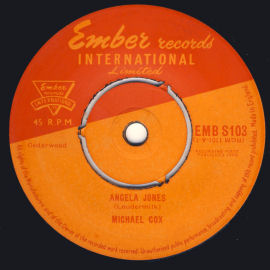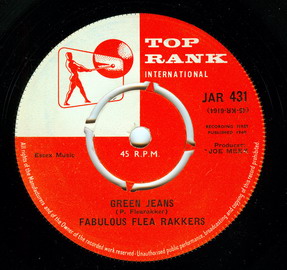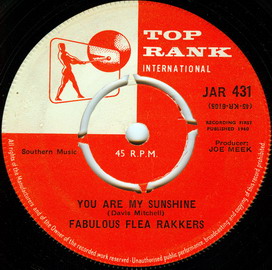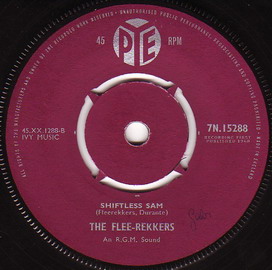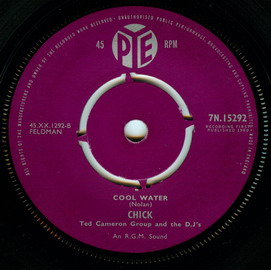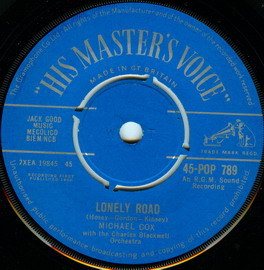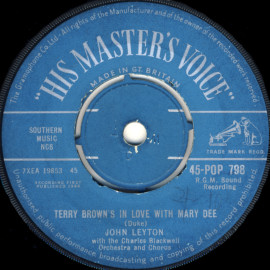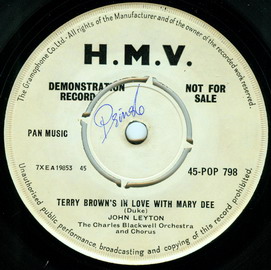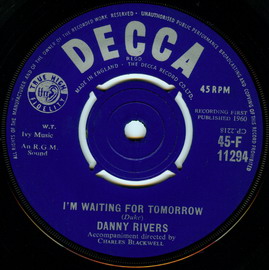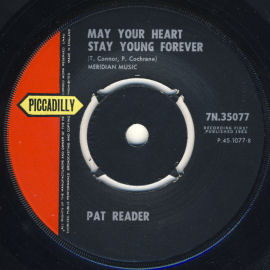The Triumph Records Story Part 4: Triumph productions on other labels / RGM Sound Ltd (
Joe Meek stopped his collaboration with Triumph Records in June 1960. At that time it had grown more and more obvious that there was a flaw in this company. What was the reason? First, Triumph ran out of money. Meek's productions were simply too expensive. Second, Triumph was unable to fulfill the self-formulated claim to open up the teenage market. Practically no Triumph record really fits in this audience, with the exception maybe of Michael Cox. The third reason in a way was to be expected: Saga was not a "standard" record company, it was a budget label (or "drugstore label", as they are called in the U.S.) and specialized in film music and classical productions at folksy prices. In spite of all their pompous ads and newsletters the company didn't get the hang of the distribution of the Triumph records. Saga delivered only to department stores, so the distribution department had the wrong contacts, the sales reps had no idea of pop music, the records ended up in the wrong shops or departments. Even when Angela Jones entered the charts after good airplay, this 45 could barely be found in the shops, and there was no money left to press further copies. On the other hand a lot of Triumph records were sold off in piles at some department stores just a few weeks after their release. After leaving Triumph, Meek did the most obvious: With his artists he continued producing recordings on his own and had no choice but returning to door-to-door selling his recordings to record companies. By doing this he was an independent record producer, which meant, he wasn't an employee of a record company, he worked on his own risk and account. He didn't invent this method, it had been common practice in the U.S. for years, but he probably was unaware of that.
Wilfred Alonzo "Major" Banks Now, after Meek had some successes in stock, Saga board member Wilfred Alonzo "Major" Banks jumped on the train. He, who once had handed the Triumph project to a colleague, smelled money now. Banks, who had made his first packet by importing artificial christmas trees to England, offered Meek a joint music production company, with the idea to pay Meek a weekly salary of 20 Pounds and to finance a self-owned sound recording studio. There Meek would be able to work without limits of time and money. The company was named "R.G.M. Sound Limited" and officially registered on September 12, 1960:
RGM letterhead
Meek started looking for studio rooms at once. He found them not far from the Saga office: three floors above a leather goods shop at 304 Holloway Road in the London district of Islington. Meek lived and worked in this flat until his death. More info on the RGM history please see here. The main customers of RGM were soon top-flight labels like HMV (His Master's Voice), Parlophone, Decca and Pye. Because of the chronological parallelism it is hard to say whether the records listed below are still Triumph or already RGM productions because Triumph wasn't shut down at once after founding RGM. Some of the recordings are remaining productions from Triumph, that's for sure. Although the record releases starting in September 1960 were entirely marked as "RGM sound production", the Meek chroniclers Gene B. Robertson and Roger Dopson in a "Record Collector" article ascribe them to the Triumph era, that's why they are listed here.
Pressing in green vinyl, released in Norway
Pressing in red vinyl, released in Norway
Pressing in blue vinyl with picture sleeve, released in Sweden
An english pressing, but only for the export. In the British shops Angela Jones remained hardly available.
The actor and singer John Leyton fell flat twice with his cover version of the US hit: It was too late for the planned Triumph release. So the record was released on Top Rank, but shortly after that the label was sold to EMI, and this single has been withdrawn from sale because EMI already carried this tune with a different singer. In fact, Leyton's Tell Laura I Love Her was available only for a very short time, if at all.
Also this record was available only for a short time, if at all.
It's not clear whether this record was manufactured. It never appeared on record fairs, and no scan or photo is known.
Single-sided test pressing
A continuation of Angela Jones, obviously an attempt to pick up the thread of the earlier hit. A practice which can be found still today in pop music.
Promo copy, not for sale
This record became Joe Meek's first #1 in the GB charts. Atmospherically an intense death song; on his way through the moor the singer hears the voice of his late darling in the sighing of the wind in the tree tops, calling him. Geoff Goddard wrote this song in just 20 minutes, and still today it's thrilling; it belongs to the best potions Meek ever brewed in his wizard's cauldron. And it's a textbook example for Meek's ability to eliminate all the superfluous bells and whistles, there's nothing left in the recording that could be omitted. Leyton is accompanied by the Outlaws; the song was arranged by Charles Blackwell; especially remarkable is the rhythm guitar which is played very precisely (it's not quite clear who played it; according to what he himself said it was session musician Eric Ford). This track is one of the few recordings in which Meek didn't speed up the vocals; instead, he slightly slowed them down. And the female refrain singing became a legend: It seems to come from a different, an "otherworldly" acoustic source: With all probability, Meek placed singer Lissa Grey (an academically skilled classical singer) in the tiled bathroom for this effect. The BBC gave to understand that this record wouldn't be played as long as it had the "morbid" lyrics line Goddard wrote originally: "I hear the voice of my darling, the girl I loved who died a year ago." Goddard then changed the lyrics. On the final record "... the girl I loved and lost a year ago" was to be heard. Which made the thing even more mysterious. The BBC blacklisted the record anyways, but Meek managed to place the song in the popular ITV series "Harpers West One". The ban finally - as often in cases like this - turned out to be first-class promotion for the song: Johnny Remember Me climbed up to the #1 spot of the charts, sold 500,000 copies and became "Record of the Year". More info on this song see also here.
Promo copy, not for sale Midnight in Luxembourg, of course, means the night program of Radio Luxembourg.
The Cha Cha On The Moon is immensely catchy and a "very meeky" production. It's a pity that nobody at Pye got the nerves to push through a release on the main label. On Pye's experimental label Piccadilly this Cha Cha had no chance to get public resonance.
Quellen/Sources: Garth Banks, Sammlung/Collection Harald Bluschke, Thomas Meyer and Jörg Richard, Record Collector 186, Feb. 1995 [Home] [Joe Meek Portrait] [Complete Recordings] [Meek Compositions] [Goddard Compositions] [Triumph Story] [CD Discography] [Noten/Scores] [Telstar Cover Versions] [Meek in Germany] [Literature, Documentaries etc.] [Miscellaneous] [Links] [About] [Contact] [Sitemap] © 2006 Jan Reetze last update: July 27, 2012
|
















